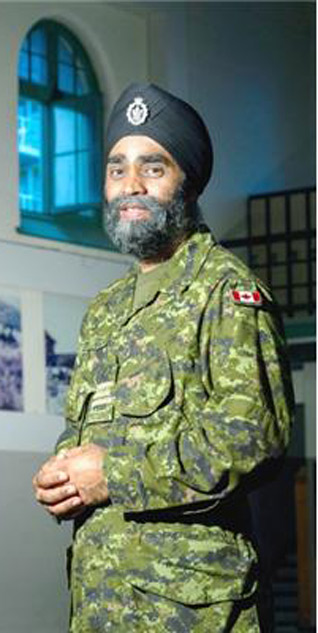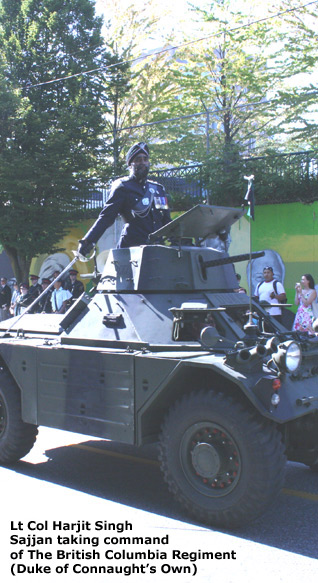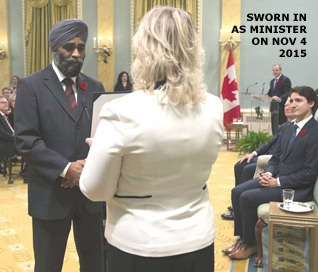Our Heroes
In Defence of the Rights of Others:
Harjit Singh Sajjan
DAPHNE BRAMHAM
It was during his first deployment to Afghanistan in 2006 that Harjit Singh Sajjan distinguished himself.
A major in the British Columbia Regiment (Duke of Connaught’s Own), Harjit took time off from his full-time job in the Vancouver police department’s gang squad to join the 1st Battalion, Royal Canadian Regiment Battle Group in Kandahar.
His job was as liaison officer to the Afghan police. Although he’d been in dangerous situations before in Bosnia and had even been wounded there, he was assured Kandahar was safe and far from the fighting.
It was anything but.
“People were turning to the Taliban because of the corruption, and we couldn’t defend that,” he says. “That stirred the hornets’ nest. There were about 40 of us and we were getting hit every day.”
He and his team not only learned of the Taliban insurgency, they discovered every single enemy defensive position.
“I didn’t know what counter-insurgency was until I got there. But when soldiers’ lives are on the line, you learn very quickly.”
Speaking to village elders, Harjit drew on his childhood experiences in Punjab and used his first language of Punjabi, which is similar enough to be understood by Urdu-speaking Afghans.
Village elders began to tell him how the young men and boys were turning to the Taliban, who promised to end widespread corruption.
“It was kind of like when I was working on the gang squad. People were telling me, ‘My son won’t listen to me. But I know he’s working for the Taliban.’”
Harjit went to Canadian Maj.-Gen. David Fraser, who was heading NATO’s regional command, and told him what they’d found. Fraser was so impressed with the major that he asked for his help in planning a major offensive west of Kandahar.
Operation Medusa began on Sept. 2, 2006, went on for 15 days and involved more than 5,000 NATO troops.
Four soldiers under Harjit’s command died. Eight other Canadians were killed during the operation, along with 14 British troops who were killed in a plane crash.
“We knew it would be a very tough fight,” said Harjit, who is reluctant to talk about his contribution because he feels responsible for the Canadian deaths.
(In fact, Harjit was reluctant to be interviewed at all. “I’m just one of many. You should see my soldiers. They’re the real rock stars.”)
But Fraser saw it differently. In his written evaluation of Harjit Singh’s performance, Fraser described him as “nothing short of brilliant.” He went on to use words like “fearless, smart and personable” with “outstanding and rare potential.”
In another evaluation, Harjit was described as having shown “remarkable personal courage … often working in the face of the enemy to collect data and confirm his suspicions and placing himself almost daily in situations of grave personal risk.”
CAREER CHANGE
Harjit admits now that he didn’t decompress properly after that first of three deployments in Afghanistan. Operation Medusa had barely ended and he was on the flight home. He’d promised his wife, Kuljit, that after two extensions of what was to have been a six-month deployment, he’d be home on that day.
Soon after returning from Afghanistan, Harjit quit the VPD. Since then, he’s continued as a reservist and started a consulting business. He teaches military personnel in Canada and the United States about how to gather information in difficult places like Afghanistan.
In 2011, Harjit went back to Afghanistan as a special adviser to U.S. Lt.-Gen. James Terry, who is now commander of NATO’s International Security Assistance Force joint command in Afghanistan.
“It’s ironic,” he says. “There I was advising the top generals, and the U.S. army doesn’t allow Sikhs (in turbans) to join.”
Harjit came back to Canada in April 2011 and, last September, was promoted to lieutenant-colonel of the B.C. Regiment, a reserve unit.
He is the first Sikh, or South Asian for that matter, to head a Canadian regiment as commanding officer.
HUMBLE BEGINNINGS
Harjit was born in Bombeli, a small village in India. There were no proper toilets in the village. His pet was a black ox that once used its massive horn to pick his sister up and toss her out of the way when she was teasing her brother.
Harjit was only two when his father, a police officer with a promising career, left for Canada in search of better opportunities.
It was four years before his father returned. But in 1976, he collected his wife, daughter and son and brought them to Vancouver.
Harjit remembers “the total sadness” he felt when he arrived. Not only had he lost the freedom to roam the family’s small farm, and the warmth of a village where everybody knew everyone else, but Harjit only spoke Punjabi.
“My sister and I were constantly crying and I remember my Mom finally slapping me and saying, ‘You’re not going back’.”
He remembers the racism, going to the mall with his family and people swearing at them.
“It was just a part of life. But at school, I didn’t have that issue. I played sports.”
By 16, Harjit knew he was travelling in the wrong circles. Among his classmates was Bindi Johal, the notorious drug lord and gangster murdered in 1998, and others who Harjit later helped arrest.
Harjit chose another path. He decided to become an amritdhari Sikh, a Khalsa. Among other things, it meant no alcohol, no cutting his hair, wearing a turban, a silver bracelet and carrying a kirpan.
“It wasn’t really a religious thing. It was an identity thing. I needed the commitment because I knew it would keep me on the right path. I found the true meaning of Sikhism and I loved the warrior aspect of it.
“When I was fighting to understand who I am, that (warrior) aspect was something that I really identified with.”
Sikhs became warriors because of persecution. But Harjit says the main religious principle is that a Sikh must be a positive and contributing member of society.
“It’s important to defend your own rights. But there is a requirement that you must defend the rights of others.
“When I was in Afghanistan, a man came up to me and said, ‘You are a Sikh and I know you must help me’.”
MILITARY WELCOMES SIKHS
Sikhism is what pushed him toward the military. Yet, ironically, it was what almost kept him out of the Canadian Forces.
At the time Harjit applied, the RCMP had just refused to accept a turbaned Sikh’s application. The Canadian Forces had no such qualms; Sikhs first served in the Canadian Army in the First World War.
But the Forces have a rule about gas masks and helmets: Everybody has to be able to wear them. But, at the time, there were no gas masks that worked over beards.
So, Harjit invented an apparatus to make it work. He’s since patented it.
As for the helmet, Harjit learned to tie his turban differently.
“I have never caved in to taking the turban off. I have integrated the principles of Sikhism in a very respectful way.”
Not only has it been an enormous benefit to Harjit, but to Canada.
While Canadian and Afghan forces were getting ready for Operation Medusa, an Afghan soldier was surprised Harjit was with the Canadian Army, not the Indian.
He was more surprised to learn Harjit was a Major.
“He told me that if Canada lets you come to the country and be an officer, if they let you do that, then maybe Canada is here to help us.
“He said if they respect you and treat you the same, then maybe what Canada says here is genuine.”
Harjit says diversity is an essential part of the Canadian Forces.
“Diversity is an operational necessity. It’s more than language skills. It’s a way of thinking. … How we are raised in Canada is very important to the fibre of the Canadian Forces.”
In Bosnia, Harjit’s turban caused a minor issue in some Serb neighbourhoods. He defused concerns by telling them that as a Sikh, he was likely the only neutral person in the Muslim/Christian conflict.
He eventually established such close rapport that an elderly woman knit him a pair of socks. Harjit still has them.
He has been wounded in battle and had so many close calls he gave up counting after 40. So I asked him about fear.
“It doesn’t matter whether it’s Cyprus, the Sinai, Bosnia, Croatia or wherever, the fear is always there. … Fear is the healthy way to do the right thing to come home alive.”
And Harjit has a lot to live for. He’s got two children, aged one and four. His wife, Kuljit, is a family physician.
Harjit attributes to Kuljit the hard-won wisdom that it’s not what you look like, but what you do that matters.
And, for the lieutenant-colonel, that means serving others.
[Courtesy: Vancouver Sun. Edited for sikhchic.com]
First published on September 8, 2012; republished on November 5, 2015
Conversation about this article
1: Teja Singh (Vancouver, British Columbia, Canada), September 08, 2012, 6:09 PM.
Lt. Col Harjit Singh, you have made Sikh-Canadians extremely proud. You represent the true essence of a saint-soldier with your humility and courage. You are a great role model for all youth, Sikh and non-Sikh alike. May Waheguru protect you and the soldiers you command and the rest of the Canadian Forces in their pursuit of justice and freedom for all!
2: Sandeep Singh Brar (Canada), September 08, 2012, 6:34 PM.
I first met Harjit in the mid 1990s when he had just returned from serving with UN Peacekeeping troops in Bosnia. I had a chance to reconnect with him last year when he was invited to be the chief guest at the annual SikhMuseum.com-sponsored Sikh Remembrance Day ceremony. All of us are asked to be the Guru's ambassadors. But Harjit is an outstanding example of that. He exemplifies with distinction what it is to be a Canadian and what it is to be a Sikh and that you can be both with no compromises. He is honorable, humble and a terrific role model of a 21th century Sikh for our younger generations.
3: Harpreet Singh (Delhi, India), September 10, 2012, 3:11 PM.
Such a full fledged Gursikh veer, master in all fields - Sikhi, official duties, domestic life, social life, etc. An ideal Sardar. Many thanks to sikhchic.com for publishing such inspiring news/articles. Like the great Saragarhi incident where twenty-one Sikh soldiers laid down their lives, the story Lt. Col. Harjit Singh ji must also be told to all Sikhs worldwide. We all can learn so much from this gursikh veer. Proud of such gursikhs.
4: Manpreet Singh (Hyderabad), September 11, 2012, 2:37 AM.
He is a role model for every young Sikh who aspires to be successful in professional life without compromising on his religious principles!
5: Jejiemder Singh (New York, USA), September 12, 2012, 9:10 PM.
Dear Veer, Keep up the good work. May Waheguru shower His blessings on you. Lots of Sikhs look up to you as you are a role model for us. I am very proud of a gursikh like you.
6: Doug Dobson (Powell River, British Columbia, Canada ), January 18, 2015, 10:44 PM.
Col., I just want to touch base with you. You were in my squadron during the brief time that I changed from RSSO to Militia Major and you were in my Squadron (approx 1990). I would appreciate a private way to contact you, email or by phone.
7: Kanwal Prakash Singh (Indianapolis, Indiana, USA), November 05, 2015, 7:29 AM.
Thank you for providing us an insight into the life, spirit, persona and accomplishments of Lt. Colonel Harjit Singh Sajjan. We welcome with great pride and thanksgiving the news about this brilliant Sikh-Canadian , The Right Honorable Harjit Singh Sajjan, appointed by the new Prime Minister, The Right Honorable Justin Trudeau, as the Minister of National Defense of Canada. From everything that we have been reading, Lt. Colonel Harjit Singh Sajjan has distinguished himself at many levels, tirelessly worked and served Canada and its people in other lands in all his official assignments, and rightly earned his place, accolades and honors. In his thoughts and actions, Lt. Colonel Harjit Singh exudes grace, understanding, and unwavering respect for others; he exceeded demanded professional competence, courage, and excellence at all times and situations. He has brought honor to his country, his profession, and the Sikh community. We joyously applaud when minority communities that are immeasurably contributing to the nations where they live and work are recognized and rewarded for their outstanding gifts, talents and service. We pray, and we are very hopeful, that in the decades ahead, more American institutions, including the U.S. Armed Forces, will embrace the rightful inclusion of Sikhs and others with their faith-mandated sacred articles, and will accelerate the removal of the archaic rules of a by-gone era, making room for the new times and diverse people that today make the fabric of our societies. We are beginning to see that they bring amazing experiences, wisdom and strengths to the new lands and have much to contribute to enrich our collective national enterprise. Our hearty congratulations to Harjit Singh, his family of all Canadians, and the entire Sikh world.
8: Sarvjit Singh (Millis, Massachusetts, USA), November 05, 2015, 10:03 AM.
All Sikhs are honored by Harjit's story. I also would like to highlight the people of Canada who made this happen. God bless Canada!





